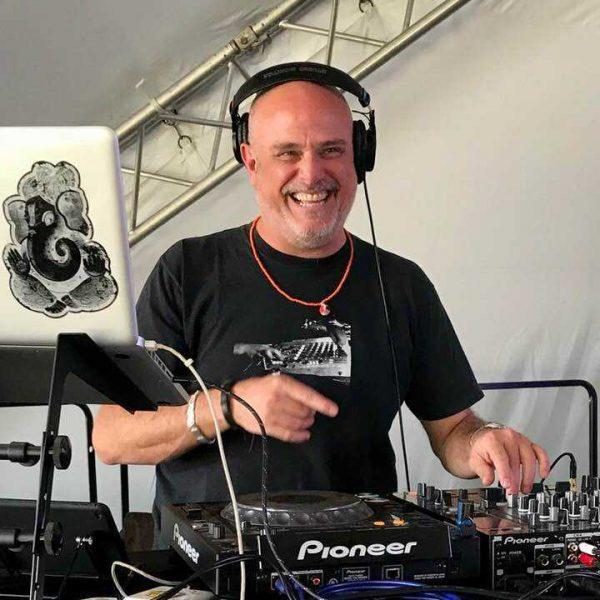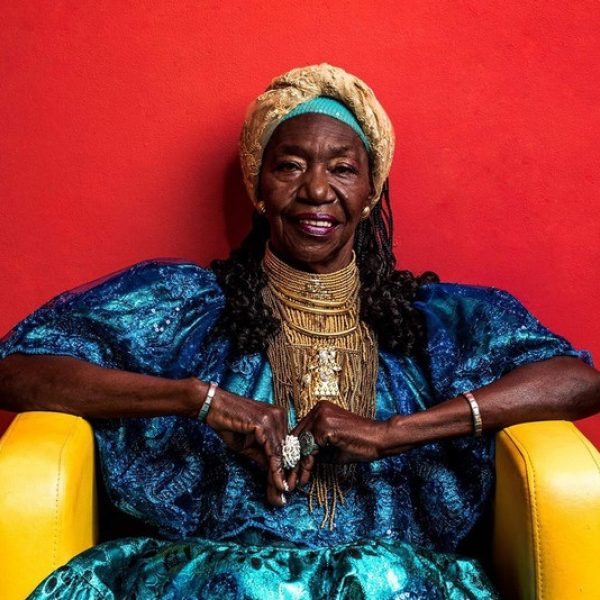The Brazilian singer Liniker caught our correspondent Harrison Malkin’s attention in 2018 when her group “Liniker e os Caramelows” were featured on NPR’s Tiny Desk. Since then, Harrison’s followed her career and has been obsessed with their blissful track, “Calmô.”
On July 19 at Lincoln Center’s Damrosch Park, less than a mile from Central Park, Liniker took the stage as part of Brazil Week to perform her latest album “CAJU.” The overwhelmingly Portuguese-speaking crowd lit up at the sight of her. It was a magical show on a steamy summer night.
But before the show, Harrison chatted with Liniker about her album and much more.
All photos by Larissa Kreili.

Liniker’s sipping a latte in the courtyard of the Park Lane hotel. “I think all my life I've been moved by my dreams,” she said. “[In] my room at this hotel, I have a view of Central Park. I'm from a city in the countryside of São Paulo. This was a dream [for me].”
The sun shone strongly, almost spotlighting us, and that meant something too. “The sun is bright because something bigger is happening,” she said.
On the second track of her new album, CAJU, Liniker de Barros Ferreira Campos, or Liniker as she’s more widely known, sings:
What we really need
Is to learn how to dream
The title track describes a journey from Japan to Brazil – countries that have a deep connection to each other. Liniker sees CAJU as both the album of her “dreams,” and a “snapshot,” of her life as it were last year — thinking about, in part, love and fear, travel and home.
“This is the story I have to share today. Thirty years from now, when I have maybe ten more albums, I’ll listen to this one and remember what it felt like to be 29…for a long time, I felt trapped in the need to prove who I am, to seek validation…“CAJU” was born from my desire to see myself with more kindness,” she said.
She told me that since turning 30-years-old, she’s felt more of a desire to find room for herself outside of art, and to choose what she actually wants to do with her time — and it seems to be making her music stronger.

“ I'm trying to have more space to live my own life without the cameras, without the crew… Not just rushing myself to do everything that I am invited [to do] or do everything that everybody wants me to do, but what I want to do, where I want to live, where I want to stay. I think it’s a decision time of my life,” Liniker said.
But my conversation with Liniker started where it ended — with dreams. Because what are dreams, if not imaginations of new possibilities and realities — in music and beyond. Freud, in “The Interpretation of Dreams,” put it like this: “dream is the dreamer's own psychical act.”
“Everything has happened because I dream a lot, and this is beautiful,” Liniker said.
When I first sat down with Liniker, I talked about how the night before I took melatonin for the first time in a long while. And after I woke up, I felt drowsy and confused. I don’t know why I revealed this, but I did. She nodded, and told me about experiencing melatonin-related nightmares. I appreciated that confession, but I wanted to know about her other dreams.
“ I'm always connected with things in the unconscious,” Liniker, who was honored in 2023 as "Immortal" by the Brazilian Academy of Culture, said. “I've been wondering a lot. And my mom allowed me to do everything I wanted. And this makes me more brave with myself and more courageous too.”

Liniker was raised by a single mother — Ângela — in a musical household. Her family got together to play samba rock. In an extended interview with El País, Liniker spoke to how supportive her mother was during childhood: “I always wanted to wear my mother's clothes, but I didn't, especially in Araraquara, a small town, because I would be harassed.”
“I'd go to a thrift store, want a dress, an earring, but I wouldn't buy them...I was fine with myself; the problem was the city…I started wearing lipstick and skirts and going out in those clothes,” Liniker went on to say.
“Then I went to Araraquara for the first time thinking, "I'm going to show them who I am." An uncle of mine questioned me, wanted to know what was going on, and gave me a piece of his clothing —"so you know how a man dresses." I thanked him but said I wouldn't wear it. And my mother defended me: "Leave Liniker alone; he's an artist.”’
That support paid off, as Liniker continues creating art and touring – playing “CAJU” throughout Brazil and Portugal this summer and fall. And she continues dreaming. “The day I stop to dream, I can die,” Liniker said.
Related Audio Programs













